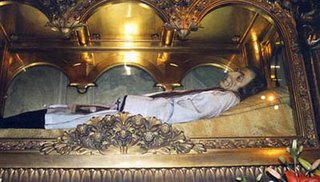
Act of Reparation to the Blessed Sacrament
By St. Louis Marie de Montfort
Let me cry, let me weep bitter tears to God above,
For Jesus is abandoned in his Sacrament of love;
Forgotten and insulted in the dwelling of the Lord,
Derided and rejected where once he was adored.
The mansions of the nobles are all clean and set with care,
Yet the house of God's forgotten, its altars standing bare;
The floor is all broken, the roof lets in the rain,
The crumbling walls are marked with holes and every kind of stain.
The crucifix is broken, the pictures green with damp,
The altar cloths are rotting, no light burns in the lamp,
The missals torn and battered, the brasswork stained with rust,
The things of God are thrown about and scattered in the dust.
The ciborium is tarnished, the chalice turning black,
The monstrance, which is made of tin, is mouldy at the back;
From font right up to sacristy the picture is the same,
Such disorder in the house of God is our reproach and shame.
The pagans in their temples dare not spit upon the floor,
But in our church a crowd of dogs run in and out the door;
They bark and fight continually and fill the place with slime,
But no one cares enough of this to avenge the dreadful crime.
There is just one exception in all this sorry scene:
My Lord and Lady's special pew is always neat and clean;
And standing out in bright new paint upon the dingy wall
Their gaily-colored coat-of-arms looks down upon it all.
Above the Lord's own altar, instead of the Lord's own name,
The banners of his Lordship, a place of honor claim;
Both priest and mule are flaunting the badges of their thrall,
The former at the altar, the latter in his stall.
The houses of the nobles are so crowded and gay,
And fashionable young ladies are courted night and day;
But the Church of God's deserted, unless they condescend
To go to church for one short Mass they think will never end.
Behold the worldly cleric coming in with haughty face
How his lady friends admire him as he bows with courtly grace!
He bobs a genuflection, then seeks whom he should greet;
He strolls about and chatters as though walking in the street
Still worse, he has a snuff-box, which he opens with a jest,
And delicately takes a pinch, then passes around the rest
Puffed up with self-importance and with his graceful ways,
He squirms about and poses, making faces as he prays
Alas, it's often happened, the way to church he's trod
To pay reverence to Venus, to a goddess not to God;
Every thought and aspiration, every word and loving glance
Are but homage to a creature, a prayer to find romance
Behold upon the other side a sorry scene is played,
A shameless hussy sitting in all her fine brocade;
In her dainty little slippers and head-dress trimmed with lace,
Come simply to parade herself within the holy place
This empty-headed madam, with an impudence unknown,
Up to the very altar ostentatiously is shown,
And poses on a bench in front, so to be seen by all,
To captivate the eyes of men and hold their hearts in thrall
To think this devil's agent, while her knee to Jesus bends,
Must rob him of his glory and lead astray his friends!
The splendor of her finery the thought of Jesus harms,
Forgotten is the altar in the presence of her charms.
And if the time seems tedious, she always has her fan,
Her dog and gloves, to pass the time, and often her young man;
She'll read a bit, and roll her eyes, and fix her hat with care,
Then look around the chapel to see who's watching her
O strike them, God almighty, strike this ungrateful lot!
At least let them respect thee, if they will love thee not
Too long hast thou been patient; thy justice let them see;
Let fear replace that insolence with which they now mock thee
Thy glory has been ravished, dishonored is thy name,
Such sinners against thy majesty must bow their heads in shame
And yet restrain thy anger, at least a while I pray;
The greatness of their wickedness with greater good repay
Forgive them, dearest Jesus, for they know not what they do;
Remember thy great Passion, and have mercy on us too
And if we are unable to atone for all our guilt,
Accept our feeble homage, and treat us as thou wilt
We confess before thy altar that we are sinners still;
Thou canst punish us or spare us according to thy will
But remember thy great mercy and the tears that we have shed,
And hear our cries for pardon, for our hearts are full of dread.






































